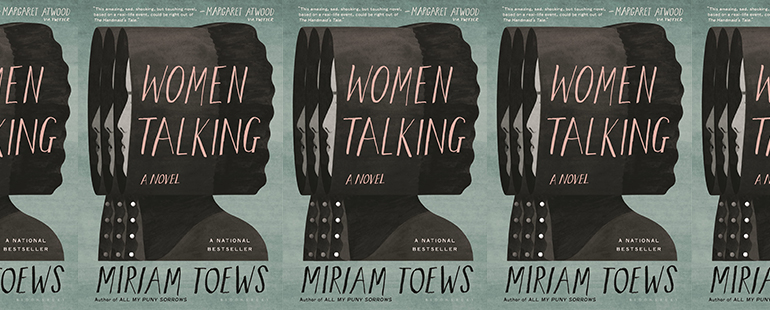Parentheticals in Miriam Toews’ Women Talking

Parentheticals may seem like a lowly subject, but Miriam Toews uses them to great effect in her 2018 novel, Women Talking, as a tool to explore and undermine ideas about objective narration, reflect on power in narration, who gets to narrate particular stories, and how the person who appears to have power in a particular story may not have power at all. In Toews’s novel, August Epps, a man and the novel’s narrator, acts as “minute-taker” for meetings of women in a Mennonite colony as they try to determine whether they will leave the community after a series of rapes committed by men in the colony. The women, who cannot read or write, have convened a series of secret meetings that form the bulk of the novel to discuss their choices, and have designated August, the colony’s school teacher, as the minute taker. August, although a man, is treated as an outsider by the other men in the colony due to his parents having been banished years before, and due to August having thus spent time outside the colony, including in prison, before returning.
The choice to filter the story through the perspective of a man, even one who lacks the same power as other men in the story, and to set up the novel so the only record of the women’s discussion and decision-making is captured by him at first feels like another act of disempowerment. But a close read of the parentheticals that form a unique structural feature of this novel suggests that Toews is not only commenting on how narration, no matter how objective it claims to be, can never be unbiased, but also on how narrators themselves may not have the power they believe they have. This potential narrative powerlessness is reinforced by the parentheticals: August as narrator frames the story, but much of his incursions come in the form of parenthetical asides. And at the end of the novel, we learn that the reason August has been asked to act as minute-taker is maybe not because the women actually want some record of their discussions, but because they are concerned that he will die by suicide and want to give him some task to prevent this, making the narrative itself largely irrelevant.
The parentheticals that August includes throughout his “minutes” ask us as readers to question from the novel’s outset the structure of the novel as a set of objective minutes and whether these minutes (or any narration) are objective or can ever be objective. One thing that stands out about the parentheticals is their inconsistent nature, as though August himself cannot make up his mind about how much he should or wants to insert himself into the story. In some places the parentheticals give context to the women’s statements and explanations about their relationships, but in others they act as a vehicle for August to insert his opinions or backstory into the narrative. There is no clear shift in the parentheticals, no one place where they move from context giving to opinion. Rather, they move back and forth from the outset. In one early parenthetical, for example, August provides background information about Neitje, one of the women, revealing that her father was “sent by [the bishop] to the remote southwest corner of the country.” Another early parenthetical reads: “Note: It’s not my intention to constantly point out that the women do not read—only when it’s necessary to explain certain actions.” Yet another merely translates the name Mejal as “meaning ‘girl’ in Plautdietsch.” On these same pages, however, some parentheticals act as opinion-giving, complicating our reading of the “objective” minutes August claims to be taking, concretizing the way that any narrative will be transformed by the narrator or teller’s experience. “Although I think, but did not say, that this could be used to illustrate the option of leaving as well,” says the next parenthetical, as August describes the images the women use to illustrate their options (do nothing, stay and fight, or leave). Here August unabashedly relates his thoughts, even contradicting the women, instead of pretending to be a dispassionate observer.
Even reading the “context-giving” parentheticals more closely reveals how they also show a stance. The information about Neitje’s father reflects the situation of August’s own parents, and suggests that August, as a quasi-outsider who feels little kinship with the other men of the colony, might have more of a stake in the narration and decision of the women than he lets on. The note about him not reiterating that the women are unable to read reminds us of the way that power works in the colony and the power that August has in his role as narrator and minute-taker. Even the choice of name (the only woman’s name) we see him translate from Plautdietsch (Mejal/girl), is an infantilizing and gendered word, suggesting that there is some level of bias reflected in the parentheticals that appear “objective” (and are possibly an example of a narrator letting his unconscious biases slip through). But this giving of context also leads us as readers to question the purpose of these minutes, and August’s understanding of his role as narrator. The women who requested the minutes presumably know this information, as do men in the colony. And the intimation at the end of the novel that the minutes are really an exercise meant not to create a story, but to save August’s life makes them even more irrelevant. August is narrating a story that no one actually needs recorded, which complicates and diminishes the control August holds as narrator.
Many of the parentheticals also contain both context and commentary, further blurring the line between what is objective context and subjectively. One such parenthetical reads: “Translator’s note: Bracka is the dried bread needed for long journeys. It is dipped or soaked in water, to soften it, and it lasts for a very long time. And second note: Had Agata noticed Ona and me up on the wash house roof?” This blurring of translation note and personal concern draws attention to the multifaceted and inconsistent nature of the parentheticals here in a way that is comic. There is no objectivity even in the parentheticals that are presented as mere translator’s notes because August cannot escape the way he plays a role in the story as narrator and recorder. And not only do the parentheticals blur the line between supposedly objective commentary and August’s interiority, but at times they become a vehicle for August to act as storyteller as well. In one instance, after relaying some of the women’s dialogue, we get this parenthetical: “After these short declarative sentences Greta has a habit of lifting her arms, dipping her head and widening her eyes as if to say, This is a fact, are you challenging me?” Here, what seems like straightforward description at first is actually an attempt to relay the thoughts of one of the women. August steps fully outside the observer role to turn himself into character-maker. Another parenthetical comments on a character’s use of the phrase “burn that bridge when we come to it,” with August clarifying that she is “intentionally using this English expression incorrectly in order to leaven the proceedings,” although we get no information to suggest that this is anything other than August’s interpretation. This appears on the surface complimentary; his interpretation of the character’s misuse of this English expression is not because she doesn’t understand English well, but because she is trying to create some cheer or diversion. But his use of the phrase leaven also ties back to baking, something that is deemed to be a woman’s role in the colony, again showing how August is not only framing his minute-taking through his own (possibly unconscious) biases, but also creating story that carries these biases.
And finally, some of the parentheticals appear entirely digressive, with August relaying information about his own life, thoughts, and situation. One such example reads, “Ona has thanked me for a thoughtful response to the questions. My joy is overwhelming, and I’m struggling to suppress it. I wish I were able to turn myself to stone as easily as Neitje and Autje do. I feel that so many problems in my life may have been prevented if I’d been more…contained.” Here there is no pretense at context-giving or keeping himself out of the narration. And in these parentheticals, we can see that Toews may be allowing August himself some insight into how his own life and circumstances are framing his role in the minutes he is taking, even as he is trying to be “contained” in how he inserts himself into the minutes, using parentheticals to keep his intrusions and insertions at a reserve.
The use of parentheticals as a device also calls attention to what takes precedence in the story. A parenthetical either suggests that the information contained in it is somehow lessor and ancillary or that it is merely informational. But the use of the parenthetical to give information that feels critical to the plot shifts the purpose of a parenthetical. Many of these parentheticals become the vehicle for narrative itself. “Stop telling me when I must eat! Salome cried,” reads one parenthetical. “Ona and I glance quickly at each other…I look down and smile,” reads another. In these instances, the action and dialogue are contained within the parenthetical, rather than the main body of the text, blurring the line between what is background and what is story. By placing the dialogue and action that move the plot in these parentheticals, Toews reflects how the women’s actions will change the course of the colony even though they are seen as ancillary by the men in power.
By subverting our expectations about what parentheticals can and should do, Toews challenges traditional rules about how power works in narrative. The women in the colony who are relegated to afterthoughts politically are still able to determine the course of their lives and the course of August’s, turning him from narrator to a parenthetical in the women’s own decision-making process.



